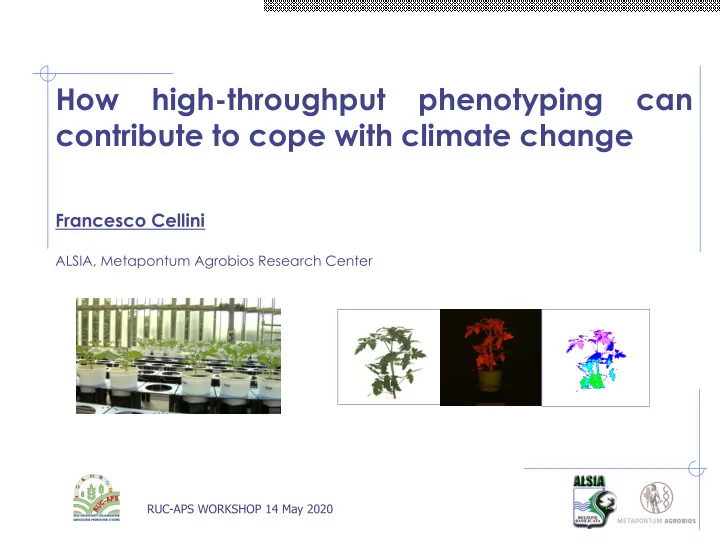

How high-throughput phenotyping can contribute to cope with climate change Francesco Cellini ALSIA, Metapontum Agrobios Research Center RUC-APS WORKSHOP 14 May 2020
ALSIA, BASILICATA, SOUTH ITALY Matera Metaponto
ALSIA MISSION AND STRUCTURE Regional Agency for the development and innovation of agrofood and agroindustry sectors through innovation transfer and implementation of Agrofood Development Services (ADS) Headquarter in Matera, a provincial office in Potenza, Agrobios R&D center in Metaponto, 8 Demonstration and Experimental farms, and two extension service units.
ALSIA ROLE AND ACTIVITIES t R&D&T activities t Agriculture extension services (dissemination, technical and organizational consultancy, marketing) t Farmer training t Agro-technical services and support
PLANTS ARE IMPORTANT https://youtu.be/6X5RqN03rWI
Phenotype and Phenome An organism phenotype, is the complex of morfological and functional characteristics, the phenome represents all the phenotypes evident in an organism
One Genome : Multiple Phenotypes From Plant Phenomics, from Sensors to Knowledge. (2017) Tardieu et al. DOI:https://doi.org/10.1016/j.cub.2017.05.055
Problems in phenotype analyses: Manual, labour intensive Costs Hidden parameters difficult to detect Sampling, desruptive measurements Local measurements Operator bias and errors
High Throughput Phenotyping by imaging: Plant Phenomics era Use of imaging remote sensors Automation Computer vision Bioinformatics Integration with IoT No sampling Statistically robust
Imaging of plants. Sensors.
Imaging of plants. Multilevel & Multiscale.
Image analyses general pipeline
Plant Phenomics Platform in ALSIA 2. Imaging stations 3.Computer NIR RGB station • ROI ( “ Region Of Interest ” ) • Digital biomass • Green and yellow indexes • Water content • Water content • % drought stress • % Drought • Fluorescence/Photosintesys • Root morphology • Stress indexes • Root Architecture 1. Conveyor system
DROUGHT IS AN URGENT PROBLEM Sentinel Data elaborated by IRPI-CNR
RESERVOIR WATER AVAILABILITY IN BASILICATA (November 2017) 122 Mcm 1/6 of the total capacity
TACKLING WATER SCARCITY WITHIN THE PHENOTYPE SPACE CONTEXT Management Agronomical practices Taxon or Genotype Mutants, natural variants, result of genetic crosses. Water Environment Light e Minerals c a Microbe p Temperature S e p y t o n e h P FAO Status of water use efficiency of main crops. SOLAW Background Thematic Report - TR07
(3D) Visible (RGB) v Biomass, Biovolume, Biomass spatial distribution, etc. v Compactness v Colour index v Health indexes
Digital biomass = Fresh weight æ å ö TV å å ç ÷ BiomasaDig ital = SV 1 + SV 2 + log ç ÷ 3 è ø å å å BiomasaDig ital = SV 1 + SV 2 + TV BiomasaDigital= Nuova Formula
Compactness
UC82b ATHB7
Compactness
Drought WW
Root- Visibile (RGB) Biomassa radicale
1 2 3 4 5 6 7 8 9
Root- Visible (RGB)
Near Infra Red (NIR) Water level in plant and soil v Analisi in Pianta v Analisi nel suolo
STUDYING BIOSTIMULANT EFFECTS ON PLANT PHENOTYPE
Biostimulant on tomato - DROUGHT STRESS 1. RGB (Red-Green-Blue) à Digital biomass 200 ml of water (recovery) 50 ml of water 50 ml of water Stress induction 200 ml of water (recovery) Stress induction UNTREATED
PLANT GROWTH Petrozza et al. (2014) Scientia Horticolturae 174:185-192,
HAIRY ROOT Water uptake in roots Biostimolante CONTROL - Acqua + Acqua
Conclusions • New fast developing technology area • Integrates multidisciplinaty approach • Produces and analyze Big Data with AI approaches • Speeds up plant breeding and plant science discoveries • Supports smart farming development with proxymal sensing technologies • Strongly contributes in finding plant phenotypes resilient to climatic change induced stresses
EPPN 2020 UE I3 Projet ‘Advanced community’ Beginning, May 2017 2017-2020 Coordination F. Tardieu 10 M € Ger, Fr., UK, NL, IT, Bel, Hungary, Finland, Slovakia, Denmark Focus: genetics of adaptation to climate change - Transnational access : @ 100 accesses, public and private, 20% outside UE - Joint research activities : Model assisted phenotyping Trans-plaform analysis Information systems - Networking https://eppn2020.plant-phenotyping.eu
THANK YOU FOR YOUR ATTENTION
Recommend
More recommend